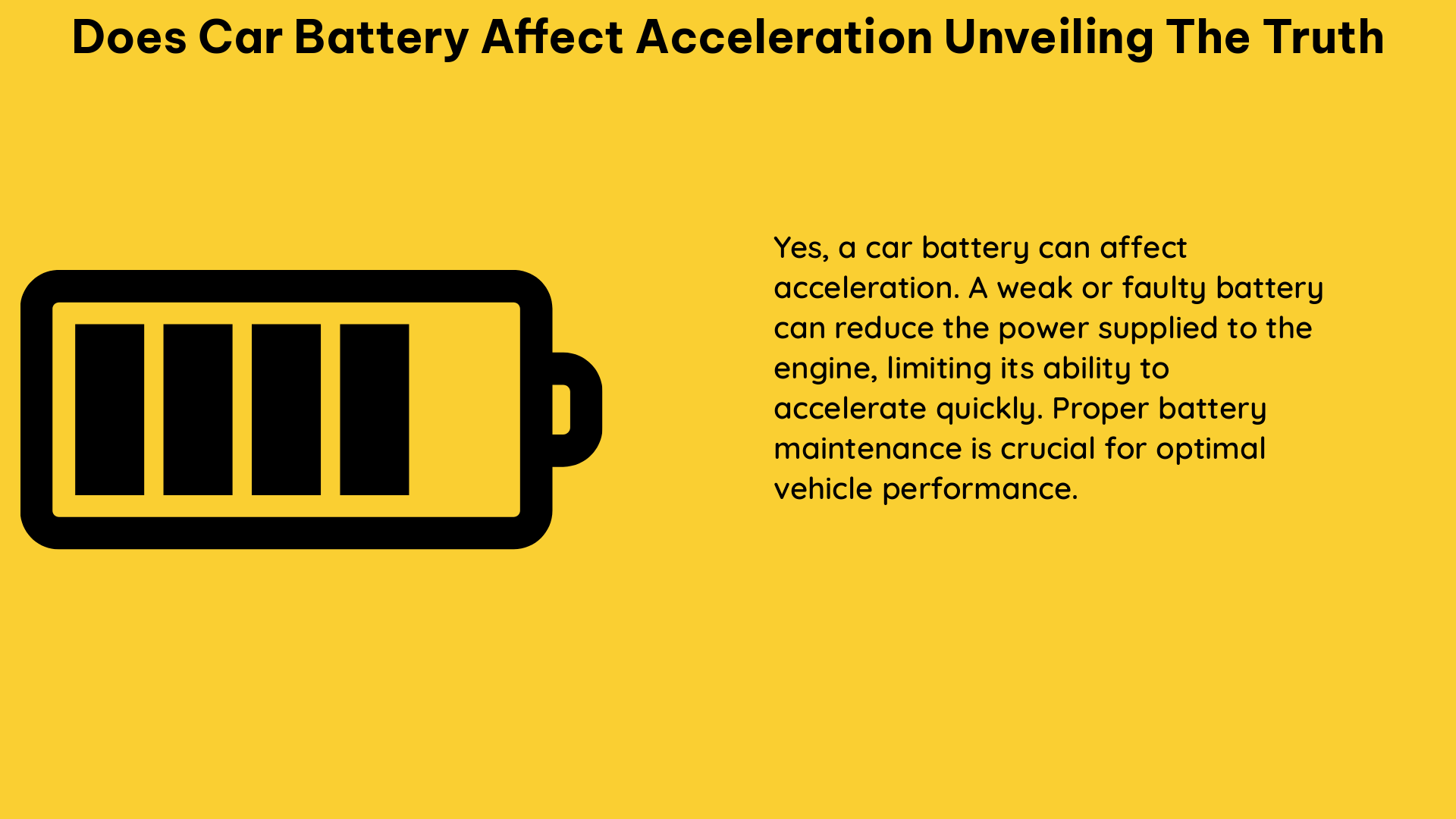A car’s battery is a crucial component that powers the vehicle’s electrical systems, including the engine’s ignition and fuel delivery. While the battery’s primary function is to provide the initial power needed to start the engine, its impact on acceleration may not be as direct as one might assume. In this comprehensive guide, we will delve into the intricate relationship between a car’s battery and its acceleration, unveiling the truth behind this often-overlooked aspect of automotive performance.
Understanding the Role of the Car Battery
The car battery serves two primary functions: starting the engine and powering the vehicle’s electrical systems when the engine is not running. When the engine is running, the alternator takes over the responsibility of providing the necessary electrical power, charging the battery and maintaining its charge.
A healthy, well-functioning battery is essential for reliable engine starting, but its impact on acceleration is more nuanced. Let’s explore the various ways in which a car battery can influence acceleration.
Indirect Influence on Acceleration

While a car battery does not have a direct impact on acceleration once the engine is running, it can indirectly affect the vehicle’s performance in several ways:
Fuel Delivery and Spark Ignition
A weak or failing battery may not be able to provide sufficient power to the fuel pump and spark plugs, which are critical components for efficient fuel delivery and ignition. If the battery cannot supply the necessary voltage and current, the fuel mixture may become lean, and the spark plugs may misfire. These issues can lead to a reduction in engine power and, consequently, a decrease in acceleration.
Electrical System Interference
The car’s electrical systems, including the throttle control and transmission, rely on the battery to function properly. If the battery is unable to provide the required power, these systems may not operate as intended, leading to a disruption in the vehicle’s acceleration response.
Battery Degradation and Capacity Loss
Over time, a car battery’s capacity and performance can degrade due to factors such as age, temperature extremes, and frequent deep discharges. As the battery’s ability to hold a charge diminishes, it may struggle to provide the necessary power for the engine and electrical systems, potentially impacting acceleration.
Measuring the Impact of the Car Battery on Acceleration
To quantify the influence of a car battery on acceleration, various tests and measurements can be performed:
-
Battery Voltage and Current Measurement: Measure the battery’s voltage and current under different load conditions, such as engine starting, idling, and acceleration. Compare the results to the manufacturer’s specifications to identify any deviations that may indicate a battery-related issue.
-
Engine Power and Acceleration Testing: Measure the engine’s power output and the vehicle’s acceleration before and after replacing a weak or failing battery. This comparison can help determine the impact of the battery on the overall acceleration performance.
-
Diagnostic Tool Analysis: Use diagnostic tools to scan the vehicle’s systems for any issues related to the battery, such as problems with the fuel pump, spark plugs, throttle control, or transmission. These diagnostic codes can provide valuable insights into the indirect ways a battery can affect acceleration.
-
Battery Capacity and Condition Assessment: Perform a comprehensive battery test to evaluate its capacity, cranking power, and overall condition. This information can help identify any degradation or issues that may be contributing to acceleration problems.
Maintaining a Healthy Car Battery for Optimal Acceleration
To ensure your car’s battery does not negatively impact acceleration, it’s essential to maintain it properly. Here are some best practices:
- Regular Battery Inspections: Have your car’s battery inspected and tested by a qualified mechanic at recommended intervals, typically during routine maintenance.
- Proper Battery Charging: Ensure the battery is charged correctly, either through the vehicle’s alternator or a dedicated battery charger, to prevent overcharging or undercharging.
- Avoiding Excessive Electrical Loads: Minimize the use of high-power electrical accessories, especially when the engine is not running, to prevent draining the battery.
- Timely Battery Replacement: Replace the battery when it reaches the end of its lifespan or shows signs of degradation, as recommended by the manufacturer.
By understanding the indirect ways a car battery can influence acceleration and following best practices for battery maintenance, you can help ensure your vehicle’s performance remains optimal, even as the battery ages.
Conclusion
While a car battery does not have a direct impact on acceleration once the engine is running, it can indirectly affect the vehicle’s performance in several ways. By understanding the battery’s role in fuel delivery, spark ignition, and electrical system operation, you can better diagnose and address any acceleration-related issues that may be linked to the battery.
By regularly inspecting, maintaining, and replacing the battery as needed, you can help ensure your car’s acceleration remains consistent and reliable, providing a smooth and responsive driving experience.
References:
– DSM Tuners Forum – Hesitation During Acceleration: Would a Bad Battery Cause This?
– Human Rights Watch – “Asleep at the Wheel”: Car Companies’ Complicity in Forced Labor in China
– MyNissanLeaf Forum – Does Fast Acceleration Cause Battery Degradation?
– Ford Integrated Sustainability and Financial Report 2023
– Reddit r/askcarguys – Can a Bad Battery Cause Accelerating and Turning?

The lambdageeks.com Core SME Team is a group of experienced subject matter experts from diverse scientific and technical fields including Physics, Chemistry, Technology,Electronics & Electrical Engineering, Automotive, Mechanical Engineering. Our team collaborates to create high-quality, well-researched articles on a wide range of science and technology topics for the lambdageeks.com website.
All Our Senior SME are having more than 7 Years of experience in the respective fields . They are either Working Industry Professionals or assocaited With different Universities. Refer Our Authors Page to get to know About our Core SMEs.